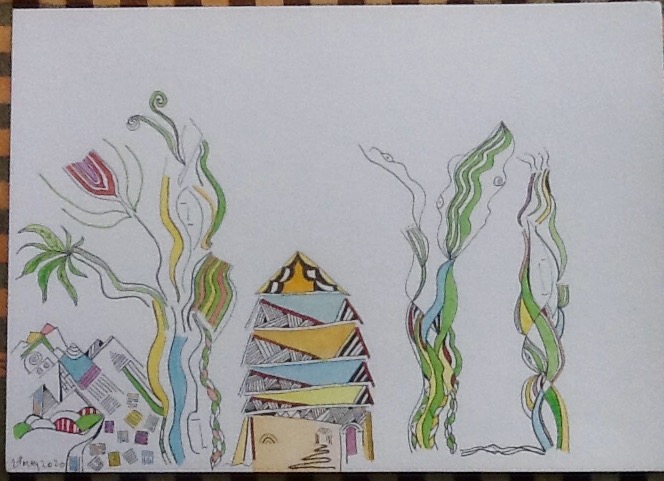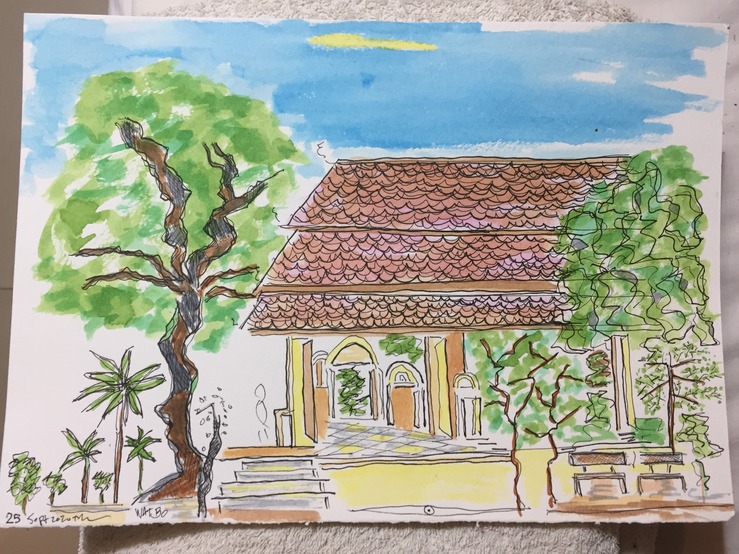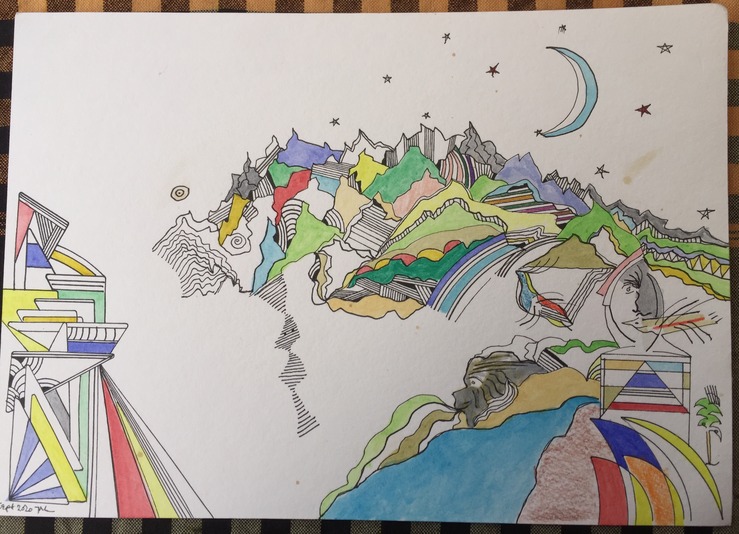Detergent Molecules
On Christmas Eve in 2001 I met a tall funny animated physicist at Relax, a vegetarian restaurant owned by two English girls in Ronda, an hour from Grazalema.
Alex worked with molecular structures in Liverpool creating simulated computer programs for a detergent company. He was paid to have fun.
“Every couple of years I shift around,” he said in a drunken state of mind. “Well this looks interesting, I say to myself. I’ll try this for a couple of years.”
His height over the world was frightening at first. His companion, another physicist from Germany was Silent Night.
I listened. When he knew I was a writer he said, “Well then I’ll give you something for your book. I’m from Canada, my family is from Hungary, I spent six years in Athens, Georgia, then in Germany and now I am in England. The cord connecting me to my past has been cut, severed. I’m just floating around having fun. I just end up in these most fascinating places. I don’t even know what I’m going to be doing two or three years from now. I just end up in a place doing my scientific work and they pay me. It’s amazing. I think I am becoming less left-brained over time. I will tell you something that happened to me recently. I discovered music. I discovered the drums. When you play the drums you cannot be analytical about it, you have to be the drum.”
He shouted in Relax. We stood at the end of the bar. Languages blended with music, laughter and colliding holiday glasses. He was in the spotlight letting it all out feeling free.
His friend had driven down from Frankfurt and they met in Barcelona for a three-week holiday. They hoped to go to Morocco. Alex was anxious. “My friend’s passport expires in six months and we don’t know if they will let him in. We want to go in at Ceuta, travel to Fez, Meknes, spend New Year’s eve in Marrakech, then go over the Atlas mountains, swing through the Sahara and back north.”
“What happens if you can’t get in?”

Laughing from a great height he threw out massive scientific hands with manicured nails.
“Then we’ll just go where we feel like it, following old roads, seeing where they go, like we did today through white villages named Benacoz and Arcos. We have no plans other than trying to get into Morocco. Neither of us has been there. We don’t know it.”
“I don’t know it either,” I said. “I’ve been traveling so long I’m a stranger to myself. Other. Before here I was there for +/- 64 days.”
“Really?” he said, combining a question with an exclamation. “What is it like? I really want to know.”
“It’s a fascinating place. It may shock you and your friend the first couple of days and then you adjust to the rhythm, dealing with the hustlers, how to see in the light. Eight hours seems like twenty-four. You are the director, audience and player on location.”
“Really?”
“Yes, really. You’ll have amazing experiences there. The people are kind and hospitable.”
“I will tell them I am from Canada even though I spent six years in Georgia. It took me six years to figure out how the Americans think and it was very strange. They live in their own little world. They don’t see out. I would talk to them and the frequency passed right through their transparent selves.”
“I know what you mean about their frequency,” I said rolling a cigarette. “Only 30% of the population has a passport. Their knowledge of foreign cultures is slight to nonexistent. After 9/11 some Americans abroad learned to say, ‘I am Canadian or Australian in Arabic.’ Others learned world geography fast.”
“I’ll bet they did. How long have you been here?”
”All day. I jumped through a window of Fate and left the states of amnesia on September 1st. After two months in Morocco I moved to Cadiz for a month and then came to this area.”
He ordered another beer. He was a tall smart kid in a brave new world. His excitement was absurd, scary, hilarious and full of repressed energy. Grabbing his space he streamed words as people squeezed past to bathrooms.
“Wow, this is really amazing. Why is this place so interesting and so full of people?”
“There’s an excellent Spanish language course at Mondragon Palace. Students come to Ronda for intensive 3-4 month classes. The city has Roman and Arabic culture, the weather is good year round and the social scene is nonstop. Plenty of recreational drugs are available, for medicinal purposes only ha, ha. It’s a good place for people to hang out.”
He laughed. “Well I’d be interested in the medicinal properties of course. Do you live here?”

“I live, hike and write in a Sierra mountain pueblo twenty-five kilometers from here. It’s called Grazalema. It’s an old Berber village. The Romans passed through on their way to Seville. I’m here for two days to see friends for the holidays.”
“Really? I never heard of it. We drove around today to a lot of places, just following the road. It was really great. This is a wonderful place,” he said, looking over people talking and drinking in candlelight. “Hey, I’ll give you something for your book. Then I’ll be in it.”
“Ok.”
“You won’t believe it but I work with a multinational company in one of their Liverpool labs. I use computer programs to create and analyze various molecules in their detergent.”
“Detergent?”
“Detergent. This is how it works. Some molecules are attracted to dirt. They adhere to it. They seek it out. Others like water. So, I assemble all these various atoms and molecules and see what they do. I introduce them to the materials and see how they react.”
“Fascinating.”
“Yes, and I get paid to have fun. They pay me to create these experiments.”
“So, you’re an artist using technology to create a canvas of detergent by painting molecules.”
“Exactly.” His enthusiasm blasted over a hip-hop rap bass beat. “You can put that in your book.”
“Why not? Readers will find your story-truth enlightening. I used to work in a town where there was a nuclear reactor and I knew physicists. Some worked with nuclear fuel waste containment, others developed hydrogen fuel cells for alternative energy sources. I never met a physicist working with detergent.”
“Yeah it’s pretty cool. And now we’re here. Did you know that the world is made up of 98% helium and hydrogen? Well, the remaining particle of atoms, a very small part is life and inside these atoms a very small part of that is intelligence. The rest of the pyramid is garbage.”
He laughed forever. “The amazing thing is how many people don’t know it or get it. The natural law is for things to get messy. That’s why people clean, rearranging molecules in some form of order. They think they’re in control of it. They’re afraid of change. Death and chaos freaks them out. Things happen outside their control or the plans of the creator. It expands the evolutionary process.”
“That’s cool. I took a statistics class once and while I wasn’t very good in statistics I learned one thing.”
“What’s that?”
“Any individual or system will do whatever is necessary to perpetuate and sustain itself.”
“That’s it,” yelled Alex. “That’s a pure definition of how the world works. That’s the exact answer.”
ART - A Memoir
Adventure, Risk, Transformation


 Share Article
Share Article